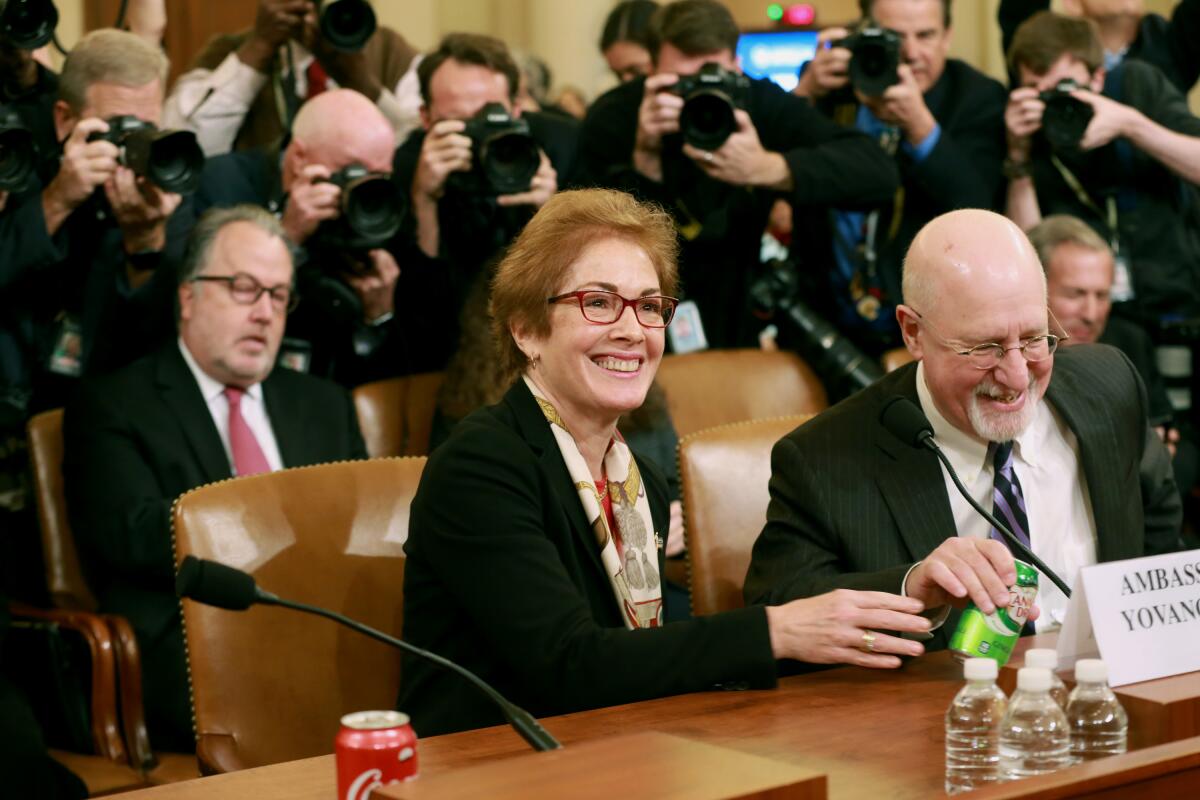Rudy Giuliani’s motivations come into sharper focus in newly released documents

- Share via
WASHINGTON — Freshly released State Department documents shed new light on why President Trump’s personal lawyer Rudolph W. Giuliani worked to have the U.S. ambassador to Ukraine removed and also reveal Giuliani’s contact with Secretary of State Michael R. Pompeo weeks before the envoy was recalled.
The documents emerged after Pompeo refused to turn them over to congressional impeachment investigators. The watchdog group American Oversight obtained the 100 pages of memos, emails and phone logs Friday night, following a Freedom of Information Act request.
They show that the White House put Giuliani in contact with Pompeo. And memos from Giuliani’s office show the early, if unverified, building blocks for the conspiracy theories that Trump and some Republicans are embracing.
Detailed memos, apparently from Giuliani’s Park Avenue business headquarters, show the conspiracies were discussed during a telephone conversation between Giuliani and Viktor Shokin, a now-disgraced former prosecutor in Ukraine, on Jan. 23. Also present for the call were Lev Parnas and Igor Fruman, businessmen who were recently arrested and charged by U.S. prosecutors with campaign finance violations.
They came up again in a meeting on Jan. 26 between Giuliani and associates and the then-prosecutor of Ukraine, Yuri Lutsenko.
In both the call and meeting, the Ukrainians claimed that Burisma, the gas company that had Joe Biden’s son on its board, was riddled with corruption, and they attempted to tie the Bidens to illicit gain. (Lutsenko recanted the claims in an interview with the Los Angeles Times.)
At one point, Shokin began to implicate Marie Yovanovitch, then the U.S. ambassador in Kyiv. He told Giuliani he believed Yovanovitch intervened to deny him a visa to travel to the United States. Then he added, without citing any evidence, “She is close to Biden.”
It has been widely reported that Giuliani was behind the smear campaign that motivated Yovanovitch’s abrupt recall in May. But the documents corroborate Yovanovitch’s statements about the visa denial as a motive. Giuliani would probably have wanted to meet personally with Shokin in New York as he did with Lutsenko.
Pompeo never publicly defended Yovanovitch. She testified last week at the impeachment hearings that she felt “kneecapped” by the succession of events, adding she did not know Giuliani’s motives.
Contained in the released documents is an April 5 letter to State Department management from six former U.S. ambassadors to Ukraine expressing alarm at what by then was a flood of reports published in some right-wing media that claimed Yovanovitch was disloyal to Trump — claims the president made again Friday during a meandering interview with TV’s “Fox & Friends.”
In the emails, State Department officials initially express uncertainty over how to handle the letter.
“Not sure what to do with this,” writes David Hale, undersecretary of State for political affairs and the No. 3 official in the department. He also testified last week.
The former ambassadors only received a “thank you for your interest” from the State Department, according to the documents.
On April 12, House Majority Leader Steny H. Hoyer (D-Md.) and Rep. Eliot L. Engel (D-N.Y.), chair of the House Foreign Relations Committee, also wrote Pompeo about Yovanovitch, expressing “deep concern” for the “outrageous efforts” to tarnish her reputation. They asked Pompeo to support her with a public statement.
A State Department official, Mary Elizabeth Taylor, did not respond until two months later.
Taylor said in that response that Yovanovitch ended her tour in Kyiv on May 20, “which aligns with the presidential transition” in Ukraine. She does not address the concerns the congressmen had raised or acknowledge that the ambassador was recalled.
The documents also reveal contacts between Giuliani and Pompeo not previously acknowledged publicly.
Giuliani’s assistant JoAnn Zafonte contacted Madeleine Westerhout, then Trump’s personal assistant, at one point asking for help in contacting Pompeo. Westerhout put Giuliani in contact with Pompeo. They had two phone calls, on March 26 and 29. Both lasted four minutes.
In testimony last week, Gordon Sondland, a major Trump donor and ambassador to the European Union, placed Pompeo, as well as most of the rest of the president’s inner circle, “in the loop” on efforts to pressure Ukraine to investigate the Bidens and on Giuliani’s unorthodox role.
It is not clear why Giuliani’s memos are in the State Department cache, but the former mayor of New York City did say he handed Pompeo what he claimed was evidence. Pompeo said he didn’t look at it and turned it over to other officials.
The documents also show a phone call between Pompeo and Rep. Devin Nunes of Tulare, the ranking Republican on the House Intelligence Committee, on April 1, three days after Pompeo’s second conversation with Giuliani. Nunes is a fervent defender of Trump, and it’s unclear what business he would have with the secretary of State.
The trove of documents released Friday “reveals a clear paper trail from Rudy Giuliani to the Oval Office to Secretary Pompeo to facilitate Giuliani’s smear campaign against a U.S. ambassador,” said Austin Evers, executive director of American Oversight.
The State Department did not immediately comment. Pompeo has dismissed the impeachment hearings as “noise.”
More to Read
Get the L.A. Times Politics newsletter
Deeply reported insights into legislation, politics and policy from Sacramento, Washington and beyond. In your inbox twice per week.
You may occasionally receive promotional content from the Los Angeles Times.











